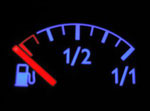In this post, David echoes what seems to be conventional eco-wisdom on high gas prices:
It’s good that gas prices are rising. We want people to buy more fuel-efficient cars and drive less.
I’m not so certain. 
Sure, high prices will spur people to use less gas. But the incentives cut both ways: high prices also spur energy companies to produce more oil. And now that most of the world’s easy-to-reach, easy-to-refine oil has already been put to the drill, high prices are making some seriously malevolent projects — Canadian oil sands come to mind — turn the corner from speculative boondoggles to respectable profit-centers.
My post here is way too longwinded, but eventually gets at the same point: energy companies are starting to give super-carbon-intensive projects, like shale oil and coal-based petroleum substitutes, a closer look. When oil’s cheap, those sorts of things make no sense. When oil’s pricey, they start to pencil out.
And more broadly, when oil prices rise, oil companies/monarchies get even richer — which means they have even more weight to throw around. (Notice, for example, that pollutions safeguards were the first policy casualty of the latest price spike.)
Now, I’m not saying that gas should be cheaper at the pump — and I’m with David in thinking that Americans might as well get used to paying more; there’s not a whole lot that consumers can do right now, other than hope they live and work in places that don’t require them to drive much.
But I am saying that enviros shouldn’t think of high gas prices as a good substitute for high gas taxes. They seem like the same thing, but they’re not; and I’m sure that there are plenty of oil company execs who hope that people lose sight of the distinction.


